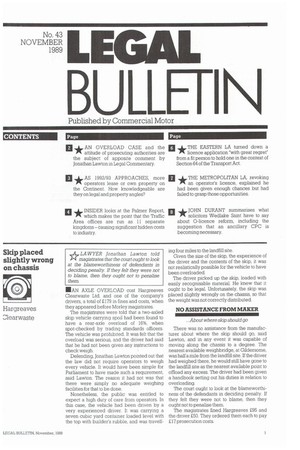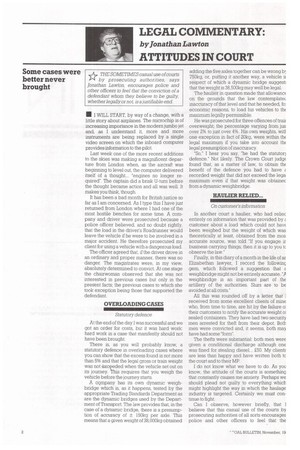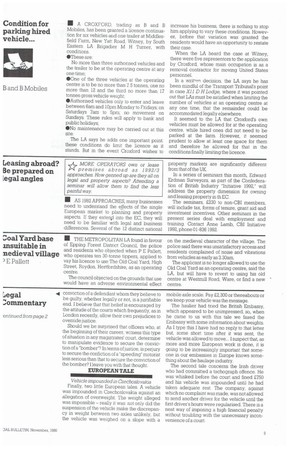LAWYER Jonathan Lawton told 1"1 magistrates that the court ought
Page 111

Page 112

Page 113

If you've noticed an error in this article please click here to report it so we can fix it.
to look at the blameworthiness of defendants in deciding penalty If they felt they were not to blame, then they ought not to penalise them.
MAN AXLE OVERLOAD cost Hargreaves Clearwaste Ltd, and one of the company's drivers, a total of £179 in fines and costs, when they appeared before Morley magistrates.
The magistrates were told that a two-axled skip vehicle carrying spoil had been found to have a rear-axle overload of 16%, when spot-checked by trading standards officers. The vehicle was prohibited. It was felt that the overload was serious, and the driver had said that he had not been given any instructions to check weigh.
Defending, Jonathan Lawton pointed out that the law did not require operators to weigh every vehicle. It would have been simple for Parliament to have made such a requirement, said Lawton. The reason it had not was that there were simply no adequate weighing facilities for that to be done.
Nonetheless, the public was entitled to expect a high duty of care from operators. In this case, the vehicle had been driven by a very experienced driver. It was carrying a seven cubic yard container loaded level with the top with builder's rubble, and was travell ing four miles to the landfill site.
Given the size of the skip, the experience of the driver and the contents of the skip, it was not realistically possible for the vehicle to have been overloaded.
The driver picked .up the skip, loaded with easily recognisable material. He knew that it ought to be legal. Unfortunately, the skip was placed slightly wrongly on the chassis, so that the weight was not correctly distributed.
There was no assistance from the manufacturer about where the skip should go, said Lawton, and in any event it was capable of moving along the chassis to a degree. The nearest available weighbridge, at Gildersome, was half a mile from the landfill site..lf the driver had weighed there, he would still have gone to the landfill site as the nearest available point to offload any excess. The driver had been given a handbook setting out his duties in relation to overloading.
The court ought to look at the blameworthiness of the defendants in deciding penalty. If they felt they were not to blame, then they ought not to penalise them.
The magistrates fined Hargreaves £95 and the driver £50. They ordered them each to pay £17 prosecution costs. NA7 THE SOMETIMES casual use of courts /*".4 by prosecuting authorities, says Jonathan Lawton, encourages police and other officers to feel that the conviction of a defendant whom they believe to be guilty, whether legally or not, is a justifiable end.
• I WILL START, by way of a change, with a little story about airplanes. The microchip is of increasing importance in the modem jumbo jet and, as I understand it more and more instruments are being replaced by a single video screen on which the inboard computer provides information to the pilot.
Last week one of the more recent additions to the skies was making a magnificent departure from London when, as the aircraft was beginning to level out, the computer delivered itself of a thought... "engines no longer required". The captain did a brisk U-turn before the thought became action and all was well. It makes you think, though.
It has been a bad month for British justice so far as I am concerned. As I type this I have just returned from London where I had one of the most hostile benches for some time. A company and driver were prosecuted because a police officer believed, and no doubt rightly, that the load in the driver's Roadrunner would leave the vehicle if he were to be involved in a major accident. He therefore prosecuted my client for using a vehicle with a dangerous load.
The officer agreed that, if the driver drove in an ordinary and proper manner, there was no danger. The magistrates were, in my view, absolutely determined to convict. At one stage the chairwoman observed that she was not interested in previous cases but only in the present facts; the previous cases to which she took exception being those that supported the defendant.
At the end of the day I was successful and we got an order for costs, but it was hard work: hard work in a case that manifestly should not have been brought.
There is, as you will probably know, a statutory defence in overloading cases where you can show that the excess found is not more than 5% and that the legal gross or train weight was not e.xceeded when the vehicle set out on its journey. This requires that you weigh the vehicle before the journey starts.
A cgmpany has its own dynamic weighbridge which is, as it happens, tested by the appropriate Trading Standards Department as are the dynamic bridges used by the Department of Transport. The law provides that, in the case of a dynamic bridge, there is a presumption of accuracy of ± 150kg per axle. This means that a given weight of 38,000kg obtained adding the five axles together can be wrong bj 750kg, or, putting it another way, a vehicle it respect of which a dynamic bridge suggest: that the weight is 38,500kg may well be legal.
The haulier in question made that allowancE on the grounds that the law contemplate( inaccuracy of that level and that he needed, fo: economic reasons, to load his vehicles to thE maximum legally permissible.
He was prosecuted for three offences of trait overweight; the percentage varying from jus over 2% to just over 4%. His own weights, wit' one exception in fact of 20kg, were within thE legal maximum if you take into account thE legal presumption of inaccuracy.
"So," I hear you say, "he had the statuton defence." Not likely. The Crown Court judge found that, as a matter of law, to obtain thE benefit of the defence you had to have recorded weight that did not exceed the lege maximum even if that weight was obtainec from a dynamic weighbridge.
In another court a haulier, who had reliec entirely on information that was provided by E customer about a load which could not havE been weighed but the weight of which was theoretically at least, obtained from the mos accurate source, was told "If you engage ir business carrying things, then it is up to you k observe the law."
Finally, in this diary of a month in the life of ar Elizabethan lawyer, I record the followinc gem, which followed a suggestion that s weighbridge might not be entirely accurate. 'VI weighbridge is an important part of the artillery of the authorities. Slurs are to be avoided at all costs."
All this was rounded off by a letter that 1 received from some excellent clients of mine who, from time to time, are hit by the failure oi their customers to notify the accurate weight ol sealed containers. They have had two security men arrested for theft from their depot Both men were convicted and, it seems, both may have had some "form".
The thefts were substantial: both men were given a conditional discharge although one was fined for stealing diesel... £50. My clients. are less than happy and have written both tc the court and to their MP.
1 do not know what we have to do. As you know, the attitude of the courts is something that constantly causes me anxiety. Perhaps we should plead not guilty to everything which might highlight the way in which the haulage industry is targeted. Certainly we must continue to fight.
Can I observe, however briefly, that 1 believe that this casual use of the courts by prosecuting authorities of all sorts encourages police and other officers to feel that the • A CROX FORD, trading as B and B Mobiles, has been granted a licence continuation for six vehicles and one trailer at Middlesfield Farm, New Yatt Road, Witney, by South Eastern LA Brigadier M H Turner, with conditions.
*These are: No more than three authorised vehicles and the trailer to be at the operating centre at any onetime; OOne of the three vehicles at the operating centre is to be no more than 7.5 tonnes, one no more than 12 and the third no more than 17 tonnes gross vehicle weight; 'Authorised vehicles only to enter and leave between 6am and lOpm Monday to Fridays; on Saturdays 7am to 5pm; no movement on Sundays. These rules will apply to bank and public holidays; ONo maintenance may be carried out at this site.
The LA says he adds one important point: these conditions do limit the licence as it stands, But in the event Croxford wishes to
A MORE OPERATORS own or lease 1-4, prernises abroad as 1992/3 approaches. How genned up are they all on legal and property aspects? Attending a seminar will allow them to find the less painful way.
• AS 1992 APPROACHES, many businesses need to understand the effects of the single European market to planning and property aspects. If they extencl into the EC, they will need to be familiar with legal and business differences. Several of the 12 distinct national • THE METROPOLITAN LA found in favour of Epping Forest District Council, the police and residents who objected when P E Pallett, who operates ten 30-tonne tippers, applied to vay his licence to use The Old Coal Yard, High Street, Roydon, Hertfordshire, as an operating centre.
The council objected on the grounds that use would have an adverse environmental effect
44 conviction of a defendant whom they believe to be guilty, whether legally or not, is a justifiable end. I believe that that belief is encouraged by the attitude of the courts which frequently, as in London recently, allow their own prejudices to override justice.
Should we be surprised that officers who, at the beginning of their career, witness this type of situation in any magistrates' court, determine to manipulate evidence to secure the conviction of a "bomber"? In terms of justice, is perjury to secure the confiction of a "speeding" motorist less serious than that to secure the conviction of the bomber? I leave you with that thought.
Vehicle impounded in Czechoslovakia Finally, two little European tales. A vehicle was impounded in Czechoslovakia against an allegation of overweight. The weight alleged was impossible really it was: not only did the suspension of the vehicle make the discrepancy in weight between two axles unlikely, but the vehicle was weighed on a slope with a increase his business, there is nothing to stop him applying to vary these conditions. However, before that variation was granted the residents would have an opportunity to restate their case.
When the LA heard the case at Witney, there were five representors to the application by Croxford, whose main occupation is as a removal contractor for moving United States personnel.
In a written decision, the LA says he has been mindful of the Transport Tribunals point in case XII D H Lodge, where it was pointed out that LAs must be satisfied when limiting the number of vehicles at an operating centre at any one time, that the remainder could be accommodated legally elsewhere.
It seemed to the LA that Croxford's own vehicles must be allowed for at the operating centre, while hired ones did not need to be parked at the farm. However, it seemed prudent to allow at least one space for them and therefore he allowed for that in the conditions finally limiting the licence.
property markets are significantly different from that of the UK.
In a series of seminars this month, Edward Erdman Surveyors, as part of the Confederation of British Industry "Initiative 1992," will address the property dimension for owning and leasing property in th EC.
The seminars, £230 to non-CBI members, will include tax, forms of tenure, grant aid and investment incentives. Other seminars in the present series deal with employment and training. Contact Anne Lamb, CBI Initiative 1992, phone 01-836 1992.
on the medieval character of the village. The police said there was unsatisfactory access and residents complained of noise and vibrations from vehicles as early as 3.30am.
The applicant is no longer allowed to use the Old Coal Yard as an operating centre, said the LA, but will have to revert to using his old centre at Westmill Road, Ware, or find a new centre.
mobile axle scale. Pay £2,300 or thereabouts or we keep your vehicle was the message.
The haulier had tried the British Embassy, which appeared to be unimpressed, so, when he came to us with this tale we faxed the Embassy with some information about weights. As I type this I have had no reply to that letter but, some short time after it was sent, the vehicle was allowed to move... I suspect that, as more and more European work is done, it is going to be increasingly important that someone in our embassies in Europe knows something about the haulage industry.
The second tale concerns the Irish driver who had committed a tachograph offence. He was whisked before the court and fined £750 and his vehicle was impounded until he had taken adequate rest. The company, against which no complaint was made, was not allowed to send another driver for the vehicle until the first drivers hours were regularised. There is a neat way of imposing a high financial penalty without troubling with the unnecessary inconvenience of a court.


























































































































































